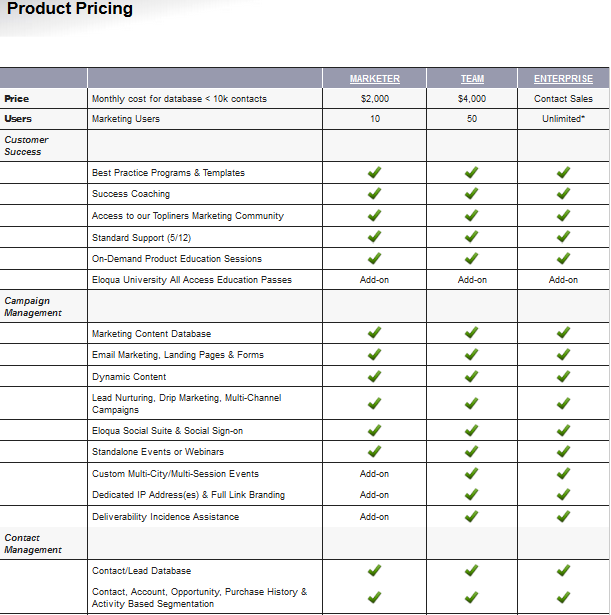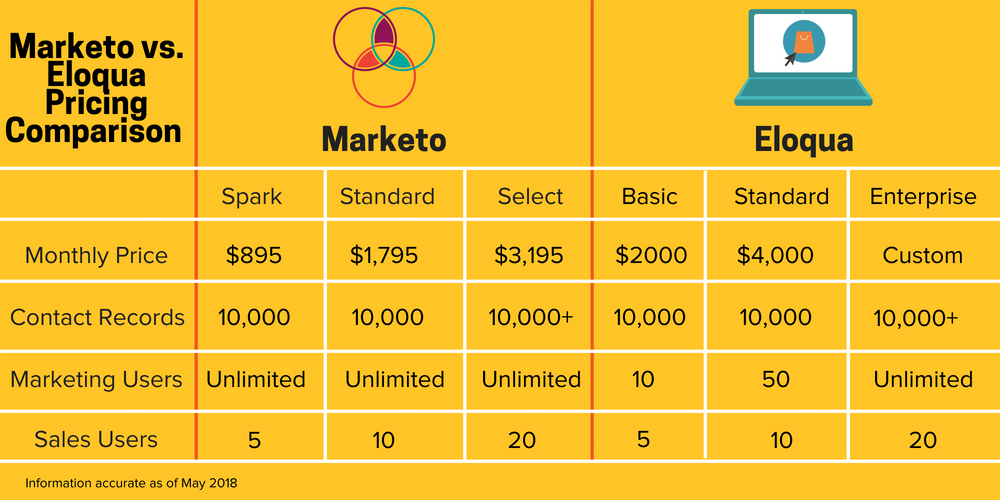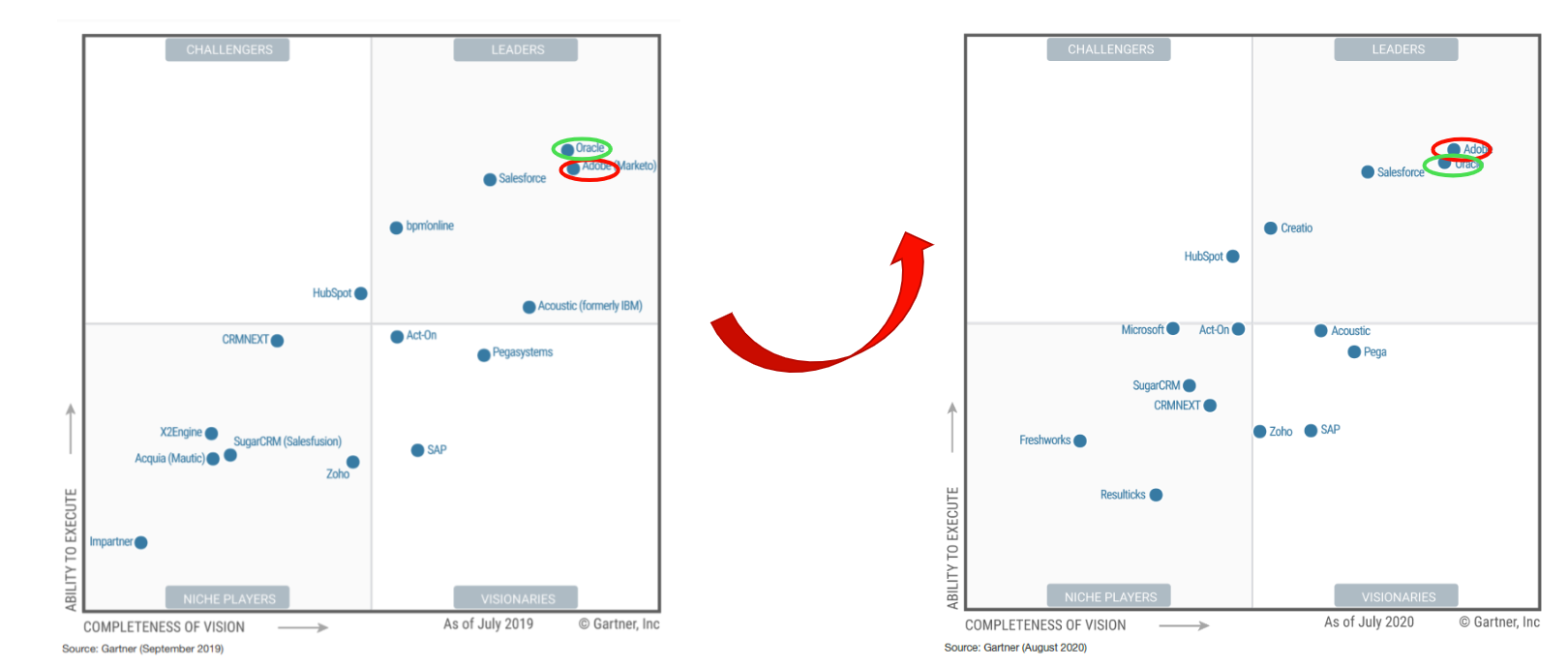Eloqua focuses on B2B marketing automation, while Marketo offers a broader range of tools for both B2B and B2C. Each platform has unique features tailored to different business needs.
Eloqua and Marketo are two leading marketing automation platforms that help businesses streamline their marketing efforts. Choosing the right one can significantly impact your marketing strategy and overall success. Eloqua excels in lead management and analytics, making it ideal for B2B companies.
On the other hand, Marketo provides versatile solutions that cater to both B2B and B2C needs, focusing on engagement and customer lifecycle management. Understanding the strengths and weaknesses of each platform is crucial for marketers aiming to optimize their campaigns. This guide will delve deeper into the key differences to help you make an informed decision.
Introduction To Marketing Automation
Marketing automation simplifies marketing tasks. It saves time and improves efficiency. Companies can reach customers easily. Eloqua and Marketo are two top tools in this space.
The Rise Of Marketing Tools
Marketing tools have grown rapidly. Businesses seek better ways to connect with customers. Here are some key factors driving this growth:
- Increased competition among brands.
- Need for personalized marketing.
- Growth of digital channels.
- Demand for data-driven decisions.
These factors push companies to adopt marketing automation. It helps track customer interactions and behaviors.
Eloqua And Marketo: Titans Of The Field
Eloqua and Marketo lead the marketing automation industry. Each tool offers unique features. Here’s a quick comparison:
| Feature | Eloqua | Marketo |
|---|---|---|
| Target Audience | B2B Focused | B2B & B2C |
| User Interface | Intuitive | Flexible |
| Integration | Oracle Products | Wide Range |
| Pricing | Premium | Varies |
Both tools provide powerful solutions. They help businesses automate tasks effectively. Choose based on your needs.

Credit: www.impactplus.com
Eloqua’s Key Features
Eloqua stands out in the marketing automation space. Its powerful tools help businesses streamline their marketing efforts. Here are some of the key features that make Eloqua a popular choice.
Advanced Email Marketing
Eloqua offers advanced email marketing capabilities. It allows users to create targeted email campaigns. Users can design emails using a drag-and-drop editor. This makes it easy to customize content.
- Automated email workflows
- Personalization options
- A/B testing for optimization
- Integration with CRM systems
These features enhance engagement and boost conversion rates. Eloqua helps brands deliver the right message at the right time.
Customizable Campaigns
Eloqua provides customizable campaigns for various marketing goals. Users can design campaigns that match their unique needs. The platform supports multi-channel marketing strategies.
- Social media integration
- Landing page creation
- Event management tools
Customization ensures brands connect with their audience effectively. Eloqua’s flexibility allows for tailored marketing solutions.
Comprehensive Analytics
Eloqua’s comprehensive analytics help businesses track their performance. The platform offers real-time data insights. Users can monitor engagement, conversion rates, and ROI.
| Metric | Description |
|---|---|
| Open Rate | Percentage of emails opened by recipients. |
| Click-Through Rate | Percentage of users clicking on links in emails. |
| Conversion Rate | Percentage of users completing a desired action. |
These analytics help marketers make informed decisions. Businesses can refine their strategies based on data-driven insights.
Marketo’s Standout Offerings
Marketo provides a range of features that enhance marketing strategies. Its standout offerings include effective lead management, seamless integration with CRM systems, and AI-driven insights. These features help businesses grow and succeed.
Lead Management Excellence
Marketo excels in lead management. It allows businesses to:
- Track leads through the sales funnel.
- Score leads based on engagement.
- Segment leads for targeted marketing.
This system improves conversion rates. Marketo’s lead nurturing campaigns guide leads toward a purchase. Businesses can send personalized content to engage leads effectively.
Seamless Crm Integration
Marketo integrates well with various CRM systems. This integration offers multiple benefits:
- Real-time data sharing.
- Centralized customer information.
- Streamlined sales and marketing collaboration.
With seamless integration, teams work better together. They can access valuable insights and act quickly. This connection enhances the overall customer experience.
Ai-driven Insights
Marketo uses AI to provide actionable insights. Key features include:
- Predictive analytics for lead scoring.
- Automated suggestions for campaign optimization.
- Behavior tracking to understand customer preferences.
These insights help marketers make informed decisions. AI-driven tools save time and increase efficiency. Marketers can focus on strategies that yield results.
Ease Of Use And User Interface
The ease of use and user interface are crucial for marketing automation tools. Both Eloqua and Marketo offer unique features. Understanding their interfaces helps users choose the right platform.
Navigating Eloqua’s Platform
Eloqua’s platform is designed for efficiency. Its dashboard is user-friendly and visually appealing. Key features include:
- Drag-and-drop functionality: Easily create campaigns.
- Customizable dashboards: Tailor your view to your needs.
- Intuitive navigation: Quickly find tools and reports.
Users appreciate the clean layout. The training resources are also helpful for newcomers.
Exploring Marketo’s Dashboard
Marketo’s dashboard offers a modern interface. It focuses on usability and quick access. Important aspects include:
- Smart Campaigns: Simple setup for marketing efforts.
- Reporting tools: Clear insights at a glance.
- Mobile optimization: Access on various devices.
The dashboard allows users to track performance easily. Many users find it engaging and straightforward.
| Feature | Eloqua | Marketo |
|---|---|---|
| Drag-and-drop Builder | Yes | Yes |
| Custom Dashboards | Yes | Yes |
| Mobile Access | No | Yes |
| Reporting Tools | Basic | Advanced |
Both platforms have their strengths. Users must assess their specific needs. The right choice depends on personal preference and requirements.
Pricing And Plans Comparison
Understanding the pricing and plans of Eloqua and Marketo is crucial. Each platform offers unique options. Businesses must choose wisely based on their needs and budget. Let’s dive into the details.
Eloqua’s Pricing Structure
Eloqua’s pricing is typically based on:
- Number of contacts
- Features included
- Support levels
It generally starts at around $2,000 per month. This can increase based on your requirements. Here’s a simple breakdown:
| Plan Type | Features | Approximate Cost |
|---|---|---|
| Basic | Basic automation, Email marketing | $2,000/month |
| Standard | Advanced analytics, Lead scoring | $3,500/month |
| Premium | Custom solutions, Dedicated support | Varies |
Marketo’s Subscription Models
Marketo offers various subscription models. Pricing is based on:
- Number of users
- Features selected
- Volume of leads
Marketo’s plans often start at around $1,000 per month. Here’s a quick overview:
| Plan Type | Features | Approximate Cost |
|---|---|---|
| Starter | Email marketing, Basic analytics | $1,000/month |
| Growth | Lead management, Advanced analytics | $2,500/month |
| Enterprise | Full marketing automation, Custom solutions | Varies |
Both platforms offer powerful tools. Choose based on your business needs and budget. Examine features closely to make an informed choice.

Credit: www.frgconsulting.com
Case Studies: Success Stories And Pitfalls
Understanding real-world examples helps businesses choose between Eloqua and Marketo. Analyzing success stories and challenges provides valuable insights. Each platform has unique strengths and weaknesses that influence marketing strategies.
Eloqua In Action
Eloqua has helped many companies achieve remarkable results. Here are a few notable success stories:
- Company A: Increased lead conversion by 40% using Eloqua’s automated campaigns.
- Company B: Enhanced customer engagement, boosting sales by 30%.
- Company C: Streamlined marketing operations, saving 20 hours weekly.
Despite its successes, some users faced challenges:
- Complex Setup: Initial configuration can be overwhelming.
- Learning Curve: Requires training for effective use.
- Cost: Higher investment compared to other platforms.
Marketo’s Wins And Challenges
Marketo also has impressive success stories that highlight its capabilities:
- Company D: Improved email open rates by 50% with targeted campaigns.
- Company E: Increased ROI by 25% through better analytics.
- Company F: Achieved 15% higher customer retention rates.
Despite these wins, Marketo users encountered issues:
- Integration Difficulties: Connecting with other tools can be tricky.
- Support: Response times may frustrate users.
- Costly Upgrades: Additional features can lead to high expenses.
| Platform | Success Stories | Challenges |
|---|---|---|
| Eloqua | 40% lead conversion increase | Complex setup |
| Marketo | 50% email open rate improvement | Integration difficulties |
Both platforms have their pros and cons. Companies must evaluate their needs carefully. Aligning with the right platform can lead to great marketing success.
The Verdict: Which One Tops The Charts?
Choosing between Eloqua and Marketo can be tough. Both tools offer unique features. Understanding their strengths helps in making the right decision. Let’s break down their features, usability, and cost.
Balancing Features, Usability, And Cost
| Tool | Features | Usability | Cost |
|---|---|---|---|
| Eloqua |
|
|
Higher pricing plans |
| Marketo |
|
|
More affordable options |
Making The Right Choice For Your Business
Identify your business needs first. Assess your budget, team size, and marketing goals. Here are some key points to consider:
- Budget: Evaluate pricing plans that fit your budget.
- Features: List must-have features for your campaigns.
- Team Expertise: Consider your team’s skill level.
- Integration: Ensure compatibility with existing tools.
Both Eloqua and Marketo have their strengths. Assess your specific requirements to decide which tool will benefit your business the most.

Credit: www.selecthub.com
Frequently Asked Questions
Eloqua Vs Marketo: What’s The Difference?
Eloqua focuses on B2B marketing automation, while Marketo offers broader solutions for both B2B and B2C.
Which Platform Is Better For Small Businesses?
Marketo is often preferred for small businesses due to its user-friendly interface and scalability options.
Can Eloqua Integrate With Other Tools?
Yes, Eloqua integrates seamlessly with various CRM and marketing tools, enhancing its functionality.
What Are The Pricing Models For Each?
Eloqua typically offers custom pricing based on enterprise needs, while Marketo provides tiered pricing plans for flexibility.
Which Has Better Customer Support?
Marketo is frequently praised for its responsive customer support and extensive resources, making it user-friendly.
Conclusion
Choosing between Eloqua and Marketo depends on your specific needs. Both platforms offer robust features for marketing automation. Eloqua excels in complex campaigns, while Marketo shines with user-friendly interfaces. Evaluate your business goals carefully. Making the right choice can enhance your marketing efforts and drive better results for your organization.


0 comments